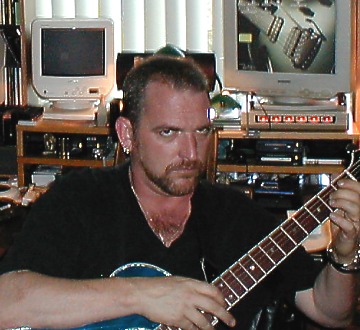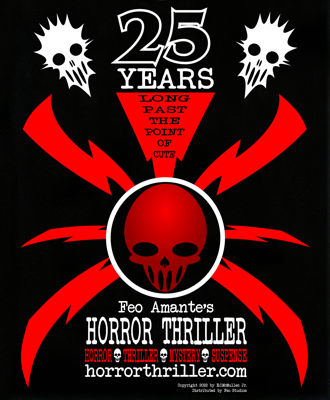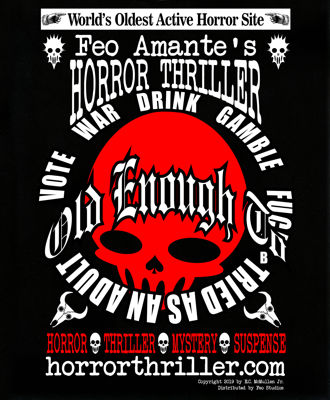INTERVIEWS
|
 |
 |
Interview by Paul V. Wargelin |
FEO AMANTE'S HORROR THRILLER
Presents An Interview With
Craig Spector
by Paul V. Wargelin
" . . . you can't change the world, so you gotta change yourself."
- Craig Spector
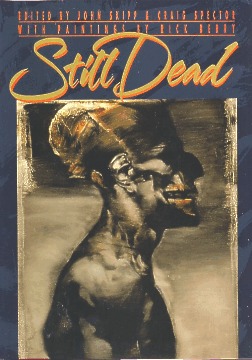
PVW: Did the term Splatterpunk also refer to the use of over-the-top gore in fiction?
Craig Spector: Sure, but I think that was just one of the most readily identifiable features. The willingness to look behind the curtains, and not to just "trust the imagination" of the reader. Was it gore for gore's sake? Not the way I was doing it. I mean if that's all that it is, saturation reaches its point where you've seen it and you're not being affected anymore. But that was never what it was about for me. People who are credited or most associated with it, I don't think that's what it was about for them, either. Every book is a Rorschach. Writers write for their reasons, readers read for their own reasons, and the critics review for their reasons.
During the last Skipp & Spector novel, Animals, I was going through a lot of the kind of emotional wreckage that the main character was going through. My life was in emotional ruins at the time and I and a lot of it was feeding into the character. It was giving me a place to articulate it and it suited the character. When the book came out, I was walking down the street with Pat LoBrutto one day, who at the time was an editor at Bantam Books. I've known Pat for years, and I asked him, "How many industry people do you think will understand or get all the things going on in here apart from the werewolf story? You know, apart from the fangs and the gore and the blood?" He thought about it for a second and said, "Hardly anyone." My first thought was "that's really sad." And my second thought was "lose the werewolves."
To me, the werewolf was metaphorical. There's a monster in it, but its a story about relationships, about animal politics, and about the things we do to ourselves and each other sort of encased in this thrilling yarn. That kind of "and he transforms and this comes screaming out and oh, blood, AHHH…" I can do that in my sleep. I can write that in a coma, because I've done it so much. Frankly, it's not particularly challenging anymore. What became challenging to me was just writing the architecture of the emotional nuance. Making sure it linked up. That to me was stimulating. And the scary part about how you can tear apart somebody that you love. I found it very frustrating that that would be totally lost because people are just expecting "Splatterpunks and they just write gore for gore's sake." But you can't change the world, so you gotta change yourself. It's time to explore things in a different way.
"I want to be inside everybody's skin."

That was the last Skipp & Spector novel, and then I was facing doing my first solo novel, and I had reached this point where it was time for a change, which doesn't mean renounce everything that you've ever done, it just means recalibrate, decide where you are now and move accordingly.
With the breakup of the partnership, it was a major crossroads in my life. It came at a pretty turbulent time. I was also going through the breakup of my first marriage, the death of my father, and some other grim life stuff, and it was all coming down at the same time. And I looked back on everything I had done to that point which was within the context of the partnership - the brand name - and I just applied what has become my methodology to it. I asked myself: if you boil all this down to its essential DNA, what is it? I looked at my entire body of work with John, and if I could boil it down to one simple thing, it was "take a real situation and injecting a level of hyper-reality into it." So I decided to stand it on its head and invert the equation: take a completely real situation and just make it get so strange that reality unravels for the character.
Great theory, but I had no idea what the story was going to be. Then one night I was doing what I usually do - I've got CNN on with closed caption in the background, and I've got music on, and I'm talking on the phone with a friend. I just looked over and saw some news blip on CNN about some horrible crime that just happened and I watched it for a second and thought, "what would it feel like to be in that situation?" And boom - the story fell almost full-blown into my head in the space of about 45 seconds. I immediately ran over to my computer and started jamming this thing out. I framed it all out, and that ended up being the thing that sold the book, about a thirty page outline.
But then when you get into it, we've gone from the theory to the model, now what do you do? You've got to go in and get into the skin of these characters: who are they, what do they do, how do they feel? Figure out who the hell you're talking about and then start talking to them. Crawl in there and try to see it the way they see it. For me, it's not just the protagonist, I want to be inside everybody's skin. I want to know because everybody's seeing it from their own side, and everybody's side is right, it's real to them. They've all got their unique angle on this thing, and because it's a reality-based story, its a thing that's highly subjective to reality. When you put things together that are diametrically opposed to each other, what happens?
Interestingly enough, Lou Aronica - who first discovered Skipp & Spector - had gone on from Bantam to Berkley. He heard about the breakup of the partnership, I had a new agent, and everything had changed. He contacted my agent, having heard about my book, and wanted to see it. And he bought it on proposal, thereby securing the ironic distinction of discovering me twice in one lifetime.
So I'm writing the book and I realize pretty quickly that this whole nifty bag of tricks that I've developed over the past 10 or 11 years aren't of any use to me. They don't work here. I had to find a new way to relate to the story. I had to find a new way of achieving the effect I was trying to achieve. That's a real interesting challenge for a writer to throw at themselves, because if you've been doing it for a while, you've always got your little bag of tricks in your hip pocket that if you hit a crunch you can toss one out. As long as it's a good trick it'll work, and then you set yourself up a challenge where none of that shit works anymore. You gotta come up with a whole new way. There's a lot of fun. That'll keep you up nights.
"We wanted to do what I thought would be legitimately cool stuff. But Hollywood being what it is, they hire you to do a thing, and the second they got you they proceed to dismantle everything that you're there to do."
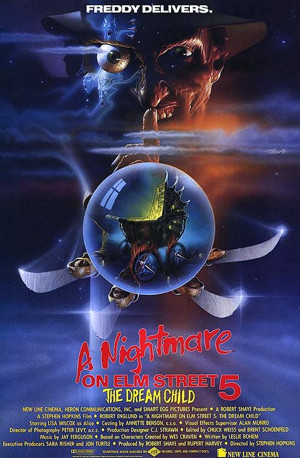
PVW: How did you become involved with A Nightmare on Elm Street?
Craig Spector: That was a Hollywood boot camp experience. Clive Barker had actually recommended John and I. We were invited to pitch because we were working on this one project and doing a rewrite on this really ridiculous film, Class of 1999 - the exciting sequel to Class of 1984, which was recently stolen and redone as The Faculty [laughs]. High schools of the future controlled by gangs, then killer robot teachers. Later on it became this brilliant new film about high schools being invaded by killer alien teachers. That gives you a little insight into Hollywood [laughs]. We were invited in to pitch, and they were having a cattle call of writers, and for some reason they liked what we had to say.
PVW: How did you feel about the final product?
Craig Spector: We got paid, it got made, end of story [laughs]. I remember going in there analyzing all the films. I thought, One was great, Two sucked, Three was great but then Frank Darabont wrote that [writer/director of The Shawshank Redemption, THE GREEN MILE, and the Kenneth Branagh's Frankenstein], and Frank's a brilliant writer. He found great stuff. He brought it back to life. And then Four was mixed - some interesting stuff, but in danger of turning the whole franchise into lame by-the-numbers-shtick.
During the pitch I told them that they were at a crossroads with this series: that they can take the high road, look at the four that have come before, take the best of the mythology, lose the rest of it, and run this thing for a long time, and it'll be great. If however they wanted to go the other way, Freddy was gonna end up on a breakfast cereal box, and they were going to pile drive this thing right into the ground. As of then, it could go either way.
So we were interjecting all this kind of stuff about Jungian concepts of the collective unconscious. They had already decided that they wanted to stay with the character of Alice, and they wanted her to be pregnant. One of the first things I said going in the door was the first order of business is everyone graduates from high school. Let's change the landscape a little bit here: scary things happen to people other than high school students. Freddy, Alice, and she's pregnant were the basic jumping off points we were given.
OK, so Freddy's been kicked out of the world again and he wants back in but he can't get back in. Alice and friends graduate from high school, and her boyfriend is the college football jock. He's going off on a scholarship, she's a working class girl from the wrong side of the tracks, and they're having their last thing together, it's gonna break up, it's all heartbreak and then he gets her pregnant. What we wanted to do is take Nightmare on Elm Street in this one and talk not about the nightmares that you have necessarily when you're sleeping, but the nightmares you have about the dreams of your life. These people are all graduating from high school, and they're looking at what the rest of their lives are going to be like. They all have dreams and they've all got nightmares.
"We were trying to chart what it is that makes a sociopath, and we started noticing parallels between Freddy Krueger and Charles Manson."
So we had Freddy over there who can't get back in. Except he could come back in through her baby. And because of the collective unconscious, the Jungian thing about that place where we all link up to each other, that's where he went. He came up through the dream pool - originally it was called The Dream Pool, our working title. We wanted the dream pool to be this image of Freddy coming back up through that subconscious place, then finding her sleeping, unborn child. A child in the womb is in a perpetual dream state. He wanted to take that over. Freddy needed to be back in the world and the best way he could do that and be the lovable, awful Freddy Krueger we all know is to recreate the circumstances that first turned him into what he was: bastard son of a thousand lunatics.
We were trying to chart what it is that makes a sociopath, and we started noticing parallels between Freddy Krueger and Charles Manson. We wanted to run with that and make it kind of a grown-up horror story. Of course we all know what happened with that. We were so young, so naïve, so unknowing in the ways of Hollywood.
|
We wanted to do what I thought would be legitimately cool stuff. But Hollywood being what it is, they hire you to do a thing, and the second they got you they proceed to dismantle everything that you're there to do. So you're basically engaging this highly paid form of torture. They're paying for your time and your creativity, but they're going to systematically dismantle your authority as the writer.
With books it's completely different - almost totally opposite - than in Hollywood. Everyone in Hollywood has one third of a screenplay. The old shtick is that everybody's got a screenplay, but that's not true. Screenplays are usually in three acts and writing an entire screenplay, that's hard. So everybody's got the first act of a screenplay, and they're just looking for somebody to put it in development so they can finish it. You can have a decent idea and get one act out of it, and you can have an idea for an ending. It's the middle act where you've got to link everything together. How many movies have you seen where it starts off great, it might have even ended great, but in the middle it kind of unraveled? Act Two is where it gets hard.
There's an old joke: a Hollywood producer with an idea is like an 80-year old man with an erection - they're so thrilled they even have one they want to show it to everyone, and it doesn't matter if its any good. Everyone thinks they can write. They're just too busy or too important or too this or too that, and nobody can point out the fact that everybody's full of shit. They don't want to admit that, so they bring you in because you have such great ideas, but the second you actually try to do any of them, you've got fifteen cooks in the kitchen trying to change it. Pretty soon, the thing's done by committee, it's completely unraveled and you are just basically reduced to a typist. You're trying desperately to perform some form of creative alchemy on this increasing abortion of a project. You're trying to hold it together and make everyone happy and serve so many different masters. I stay in because I genuinely love movies, and I guess Hollywood's just what you have to go through to get there.
I've come to the conclusion that good movies are made in spite of the process, not because of it. If you see the whole movie and you go "Wow, that was great," it was against best efforts. The system is designed to do everything under the sun to screw it up.
| DRESS NICE | |
| STORY TIME |
FEO AMANTE'S HORROR THRILLERCreated by:E.C.McMullen Jr. FOLLOW ME @ |
| Amazon |
| ECMJr |
| Feo Blog |
| IMDb |
| Stage32 |
| YouTube |
| Zazzle Shop |
